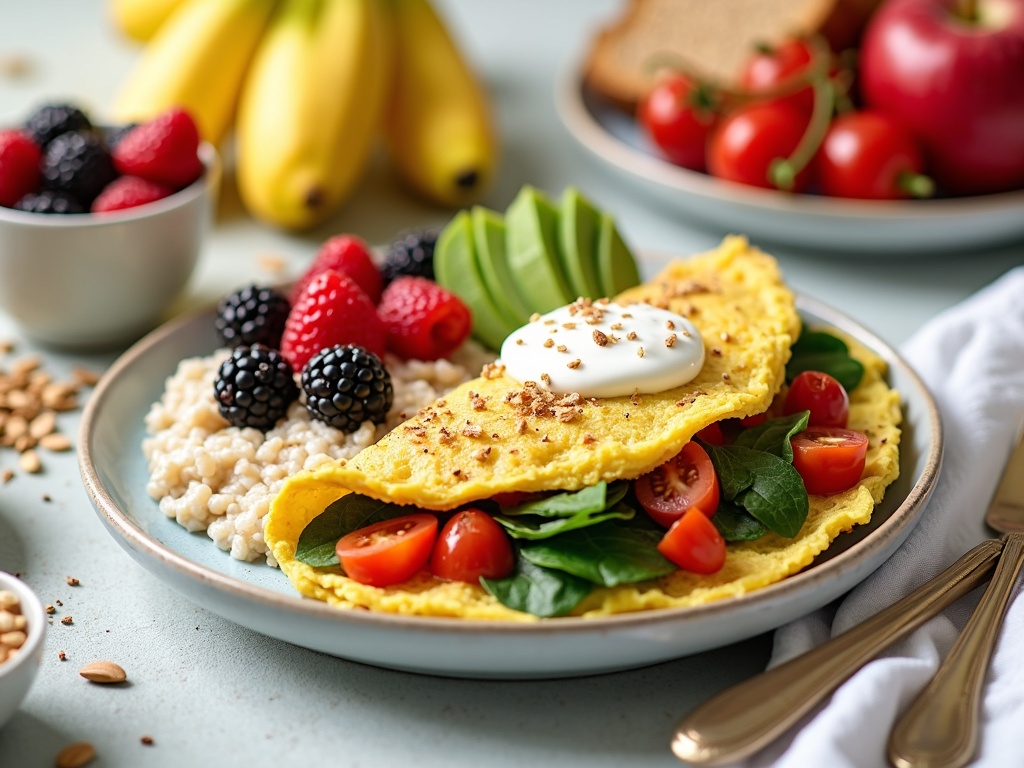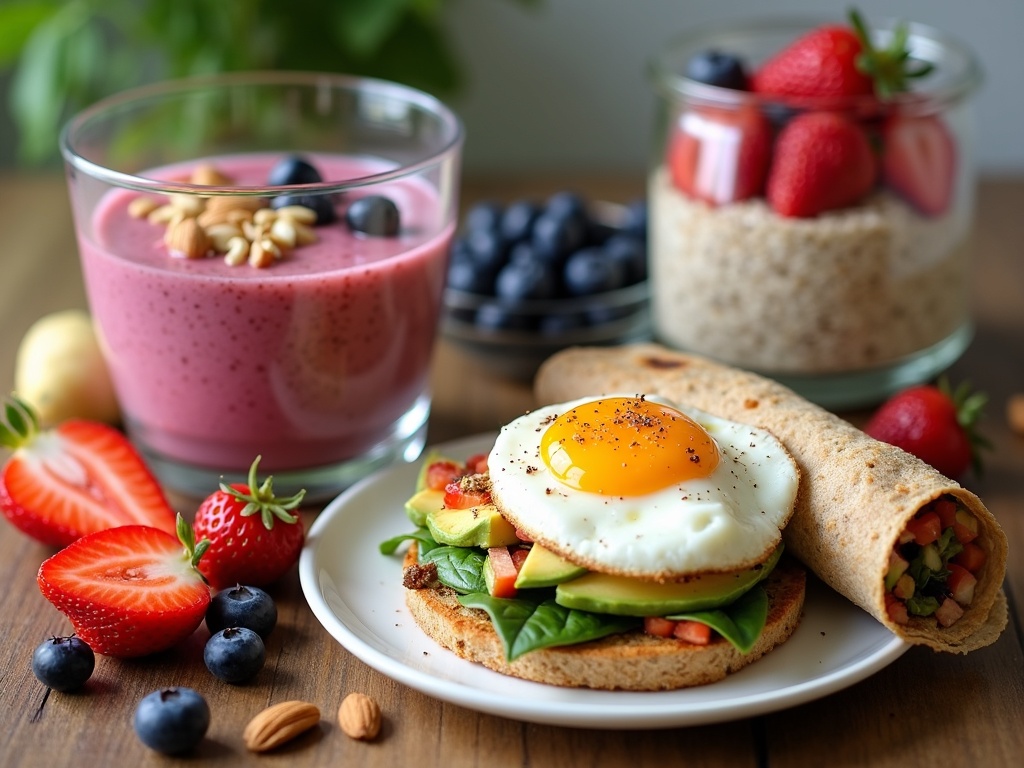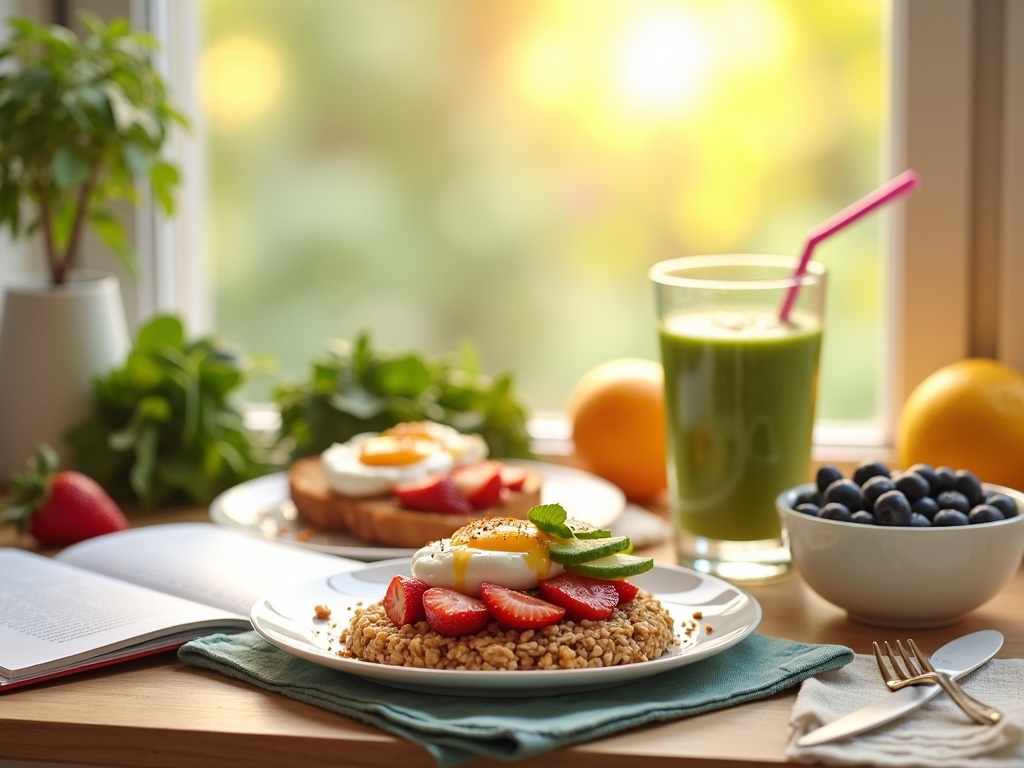A Good Healthy breakfast jumpstarts metabolism, boosts brain function, and creates a foundation for healthier eating all day. Studies confirm that regular morning meals improve heart health and lower cholesterol levels, while delivering about 20-25% of daily calorie needs through the right mix of proteins, complex carbohydrates, and healthy fats.
Find In This Article
Key Takeaways
- A balanced breakfast should combine protein (eggs, Greek yogurt), whole grains (oats, whole grain bread), healthy fats (avocado, nuts), and fruits or vegetables for maximum nutritional benefit.
- Morning meals directly improve brain power, concentration, and memory retention while helping to regulate blood sugar levels and prevent energy crashes.
- Time-saving strategies like overnight oats, smoothie bowls, and meal prepping make healthy breakfasts manageable even on busy mornings.
- Consistency matters more than complexity—establishing a regular breakfast routine delivers the greatest benefits for overall health and energy levels.
- Quick options like avocado toast, breakfast burritos, and Greek yogurt with toppings can be prepared in under 10 minutes while still providing essential nutrients.
Why Your Morning Meal Matters
Starting my day with a healthy breakfast has completely changed my morning routine and overall well-being. The first meal sets the tone for the entire day, influencing everything from energy levels to decision-making abilities.
Brain Power and Heart Health Benefits
Eating breakfast directly enhances cognitive function in ways that affect daily performance. I’ve noticed sharper concentration during morning meetings and improved memory retention when I don’t skip this essential meal. This isn’t just my personal experience – research backs it up.
According to the American Heart Association (AHA 2020), people who regularly eat breakfast have lower cholesterol levels and face reduced risk of heart disease. This makes a heart healthy breakfast not just a daily habit but a long-term investment in cardiovascular health.
A properly balanced morning meal should provide approximately 20-25% of your daily calorie needs. This isn’t about eating more—it’s about eating smart at the right time. When I consume a healthy breakfast food first thing in the morning, I’m:
- Jumpstarting my metabolism for better calorie burning throughout the day
- Helping regulate blood sugar levels to prevent energy crashes
- Setting myself up for better food choices later
- Fueling my brain for peak mental performance
Many people struggle with morning appetite or time constraints, but even simple healthy breakfast options can deliver these benefits. I’ve found that preparing quick easy healthy breakfasts the night before makes morning nutrition manageable even on busy days.
The most effective healthy breakfast meals combine protein, complex carbohydrates, and healthy fats. This winning combination creates sustained energy rather than the quick spike and crash that comes from sugary breakfast foods.
Whether you prefer traditional breakfast items or unconventional morning meals, the key is consistency. Your body and brain benefit most when breakfast becomes a non-negotiable part of your daily routine rather than an occasional practice.
Building the Perfect Breakfast Plate
Creating a nutritious breakfast is simpler than you might think. I’ve found that following a basic formula helps me put together a balanced morning meal that keeps me energized and satisfied until lunchtime.
The Foundation: Whole Grains and Protein
I always start with a whole grain base – typically 1 cup of cooked oatmeal which provides about 4g of fiber. This fiber-rich foundation helps keep me full longer and stabilizes my blood sugar. On busier mornings, a slice of whole grain bread works just as well.
Next comes protein, which is essential for muscle maintenance and satiety. I add either 2 eggs or 1 cup of Greek yogurt. Both options deliver high-quality protein that my body needs to function optimally. Eggs can be prepared in various ways – scrambled, poached, or hard-boiled – while Greek yogurt offers a creamy alternative for those who prefer it.
For healthy fats that support brain function and help absorb fat-soluble vitamins, I include either 1/4 of an avocado or 1 tablespoon of nut butter. These fats make the meal more satisfying and add delicious flavor to my healthy breakfast.
Adding Color and Nutrients
No healthy breakfast foods plate is complete without fruits and vegetables. I always add about 1/2 cup of fresh fruit – strawberries are a fantastic choice since 1 cup contains just 49 calories while providing 100% of daily vitamin C requirements. Other great options include:
- Blueberries for their antioxidant properties
- Sliced banana for potassium
- Apple chunks for additional fiber
- Citrus segments for vitamin C boost
For an extra nutritional punch, I sometimes add 1/2 cup of sautéed vegetables like spinach, bell peppers, or mushrooms. This simple addition significantly increases the vitamin and mineral content of my easy healthy breakfast.
Finally, I season my plate with herbs, spices, or a touch of honey. Cinnamon on oatmeal, fresh herbs with eggs, or a drizzle of honey on yogurt adds flavor without excessive calories or sugar.
By following this formula, I’ve created countless healthy breakfast options that keep me satisfied and energized. The beauty of this approach is its flexibility – I can swap ingredients based on what’s available while maintaining the nutritional balance that makes breakfast truly the most important meal of the day.
Power-Packed Ingredients for Your Morning
Starting your day with a healthy breakfast sets the right tone for everything that follows. I’ve found that focusing on nutrient-dense ingredients creates the perfect foundation for sustained energy and improved focus throughout the day.
Essential Components for Nutritional Balance
Whole grains form an excellent base for any morning meal. Oats contain beta-glucan fiber that helps regulate cholesterol levels, while whole grain bread provides lasting energy through complex carbohydrates. I like to combine these with protein sources for a complete meal.
Speaking of proteins, eggs are nutritional powerhouses offering 6g of protein each, along with brain-boosting choline and vitamin D. Greek yogurt and cottage cheese serve as versatile alternatives that pack impressive protein counts with the added benefit of probiotics for gut health.
Don’t forget about healthy fats – they’re crucial for satisfaction and nutrient absorption. Avocados deliver monounsaturated fats along with potassium and fiber. A handful of nuts or a sprinkle of seeds like chia, flax, or pumpkin adds texture and omega-3 fatty acids to any healthy breakfast options.
Fruits add natural sweetness and vital vitamins to your morning routine:
- Berries offer antioxidants and lower sugar content than many other fruits
- Bananas provide potassium and natural energy
- Apples contain pectin fiber that supports digestive health
Vegetables might not seem like traditional breakfast foods, but incorporating them creates heart-healthy breakfast options. Spinach can be easily added to smoothies or egg dishes, while tomatoes and bell peppers work perfectly in savory breakfast bowls or omelets.
I’ve found that mixing and matching these healthy breakfast foods creates endless possibilities. For busy mornings, I prepare overnight oats with Greek yogurt, berries, and a sprinkle of nuts. When I have more time, a vegetable omelet with avocado and whole grain toast becomes my go-to for sustained energy.
By keeping these power-packed ingredients on hand, creating healthy breakfast meals becomes simpler and more intuitive. The key is balance – combining protein, complex carbohydrates, healthy fats, and produce creates the perfect formula for morning nutrition that keeps you energized and satisfied until lunch.

Quick and Easy Good Healthy Breakfast Ideas
Starting my day with a healthy breakfast doesn’t need to be time-consuming. I’ve discovered several quick options that pack nutrition without sacrificing flavor or adding stress to my morning routine.
Nutrient-Packed Morning Starters
A smoothie bowl makes for a refreshing and customizable breakfast choice. I simply blend a handful of spinach, a ripe banana, and a scoop of Greek yogurt until smooth. The magic happens with toppings – I sprinkle fresh berries, sliced almonds, and a drizzle of honey for added texture and flavor. This healthy breakfast food delivers protein, vitamins, and antioxidants in one colorful bowl.
Overnight oats have saved my busy mornings countless times. Before bed, I mix rolled oats with almond milk and a tablespoon of chia seeds in a jar. I add sliced strawberries or blueberries, seal it, and place it in the fridge. By morning, I have a ready-to-eat healthy breakfast meal packed with fiber and protein.
Avocado toast offers the perfect balance of healthy fats and protein. I mash half an avocado onto a slice of toasted whole grain bread, add a sprinkle of salt and red pepper flakes, and top it with a poached egg. The combination creates a heart-healthy breakfast that keeps me full until lunch.
For mornings when I need something substantial, a breakfast burrito hits the spot. I warm a whole wheat tortilla and fill it with scrambled eggs, black beans, diced tomatoes, and fresh spinach. This portable easy healthy breakfast option delivers protein, fiber, and vegetables all wrapped into one handheld meal.
These quick options offer variety while maintaining the nutritional benefits of a healthy breakfast option. The best part? None takes more than 10 minutes of active preparation time, making them perfect solutions for busy mornings when I still want to prioritize nutrition.

Make It Work for Your Lifestyle
I’ve found that a healthy breakfast becomes much easier to maintain when it fits seamlessly into your daily routine. Even with a packed schedule, there are simple strategies to ensure you start your day with proper nutrition.
Smart Meal Prep Tactics
Meal prepping has changed my morning routine completely. By dedicating just an hour on Sunday, I can prepare nutritious breakfasts for the entire week. Overnight oats stored in mason jars, egg muffins packed with vegetables, and pre-portioned smoothie ingredients in freezer bags make mornings run smoothly.
I’ve also started tracking my nutrition using apps like MyFitnessPal or Cronometer. These tools help me understand my nutrient intake and ensure I’m getting the right balance of proteins, carbs, and fats to start my day. They’ve been especially helpful for identifying patterns and making adjustments to my healthy breakfast meals over time.
Quick Time-Saving Techniques
Preparing ingredients the night before has been a game-changer for my mornings. I chop fruits, portion yogurt, or mix dry ingredients for pancakes so everything is ready to go. This simple step saves precious minutes when I’m rushing out the door.
For those extra busy days, I keep grab-and-go options readily available. Some of my favorite quick choices include:
- Pre-portioned bags of nuts and dried fruits
- Hard-boiled eggs (prepared twice weekly)
- Whole grain bread with single-serve nut butter packets
- Greek yogurt cups with a small container of granola
- Healthy breakfast foods like homemade energy bars cut into portions
These ready-to-eat options ensure I never skip breakfast, even on my busiest mornings. I’ve noticed that having these healthy breakfast options visible in my fridge or pantry makes me more likely to choose them over less nutritious alternatives.
Setting up a dedicated breakfast station in my kitchen has also helped streamline my morning routine. I keep all breakfast essentials—blender, toaster, breakfast bowls—in one area, making preparation faster and cleanup simpler.
The key to maintaining a heart-healthy breakfast habit isn’t about having complicated recipes—it’s about creating systems that work with your life, not against it. By implementing these straightforward strategies, I’ve transformed my morning meals from a daily struggle into an easy healthy breakfast routine that supports my wellbeing without adding stress to my day.

Sources:
American Heart Association 2020, Harvard Health, Journal of Nutrition and Metabolism

